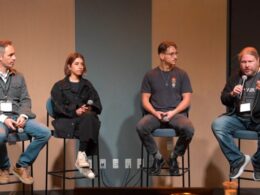VentureBeat recently sat down (virtually) with Michael Sherwood, chief innovation and technology officer for Las Vegas, to gain insights into how he uses the latest AI and endpoint security technologies to secure the city. Sherwood oversees the city’s cybersecurity infrastructure, strategy, and eclectic inventory of digital assets, IoT, and operational networks. He is also leading an open-source data initiative that shares the city’s operational data with other municipalities, universities, and global think tanks to see how Las Vegas can stay on the cutting edge of innovation.
Sherwood’s teams rely on managed detection and response (MDR) services strengthened with AI and machine learning (ML)-based applications to protect their endpoints, infrastructure, and the growing open-source database. The team also continually tracks inbound nation-state attackers attempting to perform reconnaissance and disrupt high-profile events. Sherwood says:
“The rising incidence of nation-state probes on our infrastructure coincides with world-known events, including the Formula 1 race and the 2024 Super Bowl.”
Las Vegas relies on a broad base of cybersecurity vendors, including CrowdStrike, Darktrace, Dell, NTT, and Veza, as the city switches to a hybrid multi-cloud environment to protect sensitive data and critical infrastructure. Sherwood emphasizes the importance of security and states:
“Security is crucial to how my team and I approach innovation. We’re focusing on how to deliver memorable, secure experiences at scale across each area of our city infrastructure. Security has to be core to any innovation to preserve trust.”
Las Vegas has been at the forefront of adopting cutting-edge technology to improve city operations and infrastructure. Sherwood explains:
“For example, we’re testing autonomous vehicles, implementing smart traffic signals, and building an open data hub to share real-time data. AI and ML help us synthesize all this data to glean insights and optimize city services.”
Protecting the city from cyberattacks is a top priority for Sherwood and his team. They are responsible for orchestrating the optimal use of cybersecurity technologies to ensure key services are reliably delivered. Sherwood mentions the three main challenges they face:
- The threat of cyberattacks aimed at high-profile targets and disrupting events.
- Protecting essential city services for residents and visitors.
- Safeguarding the city’s global name reputation and ensuring overall safety.
In 2020, Las Vegas experienced a cyberattack, and Sherwood shares the details:
“It was an early Sunday morning around 4 a.m., and I received a call informing me of a breach attempt. Thanks to the quick work and collaboration of our teams, there was no data loss or major issues. AI and advanced analytics allow us to detect subtle anomalies and multiply the effectiveness of the city’s security team.”
As Las Vegas continues to grow as a tech hub and smart city, data privacy and security become increasingly important. Sherwood stresses the significance of privacy and security in their initiatives:
“As CIO, I am very focused on privacy and security by design in every one of our data and security initiatives. Collaborating with leading cybersecurity providers, including CrowdStrike, is key to our ability to serve and protect our residents and visitors.”
Sherwood believes that with proper safeguards, data can unlock new opportunities while respecting people’s rights. Building public trust is crucial in embracing the smart city concept.
Overall, Las Vegas is leveraging AI and endpoint security technologies to ensure the reliability and security of its infrastructure and services. By sharing data and insights through open-source initiatives, the city aims to stay innovative and at the forefront of technology.










